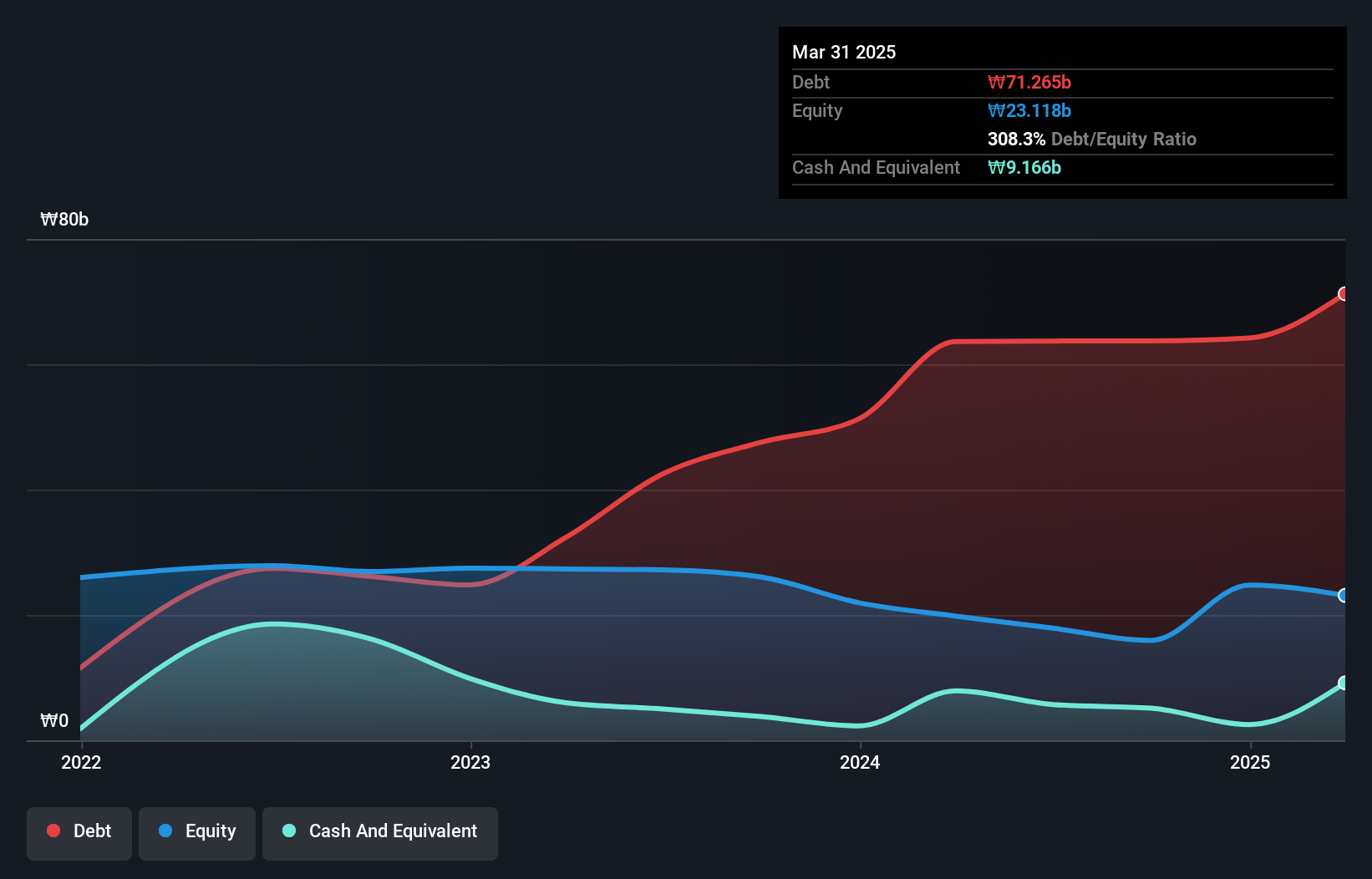Howard Marks put it nicely when he said that, rather than worrying about share price volatility, 'The possibility of permanent loss is the risk I worry about... and every practical investor I know worries about.' So it seems the smart money knows that debt - which is usually involved in bankruptcies - is a very important factor, when you assess how risky a company is. Importantly, Kwang Jin Ind. Co., Ltd. (KOSDAQ:026910) does carry debt. But should shareholders be worried about its use of debt?
What Risk Does Debt Bring?
Debt assists a business until the business has trouble paying it off, either with new capital or with free cash flow. In the worst case scenario, a company can go bankrupt if it cannot pay its creditors. However, a more common (but still painful) scenario is that it has to raise new equity capital at a low price, thus permanently diluting shareholders. Having said that, the most common situation is where a company manages its debt reasonably well - and to its own advantage. The first thing to do when considering how much debt a business uses is to look at its cash and debt together.
What Is Kwang Jin Ind's Debt?
You can click the graphic below for the historical numbers, but it shows that as of March 2025 Kwang Jin Ind had ₩71.3b of debt, an increase on ₩63.6b, over one year. However, because it has a cash reserve of ₩9.17b, its net debt is less, at about ₩62.1b.

How Strong Is Kwang Jin Ind's Balance Sheet?
Zooming in on the latest balance sheet data, we can see that Kwang Jin Ind had liabilities of ₩47.3b due within 12 months and liabilities of ₩29.8b due beyond that. On the other hand, it had cash of ₩9.17b and ₩7.70b worth of receivables due within a year. So its liabilities outweigh the sum of its cash and (near-term) receivables by ₩60.2b.
This deficit casts a shadow over the ₩19.7b company, like a colossus towering over mere mortals. So we definitely think shareholders need to watch this one closely. At the end of the day, Kwang Jin Ind would probably need a major re-capitalization if its creditors were to demand repayment. There's no doubt that we learn most about debt from the balance sheet. But it is Kwang Jin Ind's earnings that will influence how the balance sheet holds up in the future. So when considering debt, it's definitely worth looking at the earnings trend. Click here for an interactive snapshot.
Check out our latest analysis for Kwang Jin Ind
Over 12 months, Kwang Jin Ind reported revenue of ₩60b, which is a gain of 16%, although it did not report any earnings before interest and tax. We usually like to see faster growth from unprofitable companies, but each to their own.

Caveat Emptor
Over the last twelve months Kwang Jin Ind produced an earnings before interest and tax (EBIT) loss. Its EBIT loss was a whopping ₩7.1b. Combining this information with the significant liabilities we already touched on makes us very hesitant about this stock, to say the least. That said, it is possible that the company will turn its fortunes around. But we think that is unlikely, given it is low on liquid assets, and burned through ₩2.9b in the last year. So we think this stock is risky, like walking through a dirty dog park with a mask on. There's no doubt that we learn most about debt from the balance sheet. But ultimately, every company can contain risks that exist outside of the balance sheet. These risks can be hard to spot. Every company has them, and we've spotted 2 warning signs for Kwang Jin Ind (of which 1 is a bit unpleasant!) you should know about.
When all is said and done, sometimes its easier to focus on companies that don't even need debt. Readers can access a list of growth stocks with zero net debt 100% free, right now.
Valuation is complex, but we're here to simplify it.
Discover if Kwang Jin Ind might be undervalued or overvalued with our detailed analysis, featuring fair value estimates, potential risks, dividends, insider trades, and its financial condition.
Access Free AnalysisHave feedback on this article? Concerned about the content? Get in touch with us directly. Alternatively, email editorial-team (at) simplywallst.com.
This article by Simply Wall St is general in nature. We provide commentary based on historical data and analyst forecasts only using an unbiased methodology and our articles are not intended to be financial advice. It does not constitute a recommendation to buy or sell any stock, and does not take account of your objectives, or your financial situation. We aim to bring you long-term focused analysis driven by fundamental data. Note that our analysis may not factor in the latest price-sensitive company announcements or qualitative material. Simply Wall St has no position in any stocks mentioned.
About KOSDAQ:A026910
Kwang Jin Ind
Manufactures and sells hot rolled, cold drawn, and peeled steel bars in South Korea.
Acceptable track record and slightly overvalued.
Market Insights
Community Narratives




